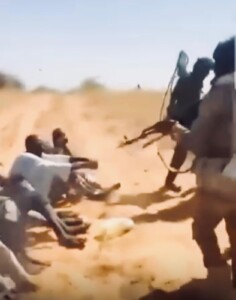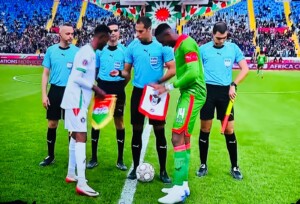UN Women: At Heaven’s Doors – the story of Bab El Ginan
In an effort to ensure women’s needs and concerns are adequately addressed and that they have access to the resources and opportunities they need, UN Women has been focussing on involving women in decision-making and negotiation. UN Women Communication Officer Ahmed Amin Ahmed tells the story of Bab El Ginan.
 Bab El Ginan with her two goats (Ahmed Amin Ahmed/UN Women)
Bab El Ginan with her two goats (Ahmed Amin Ahmed/UN Women)
In an effort to ensure women’s needs and concerns are adequately addressed and that they have access to the resources and opportunities they need, UN Women has been focussing on involving women in decision-making and negotiation. UN Women Communication Officer Ahmed Amin Ahmed tells the story of Bab El Ginan.
Bab El Ginan Mohamed Ishag Adam is a 42-year-old widow from Manawashi village in Mershing locality, South Darfur. She lost her husband years ago in one of the many conflicts that the Darfur region has witnessed over the past 18 years.
"Over 75 per cent of farmers in Darfur are women and they are the main labour force in the region"
Over 75 per cent of farmers in Darfur are women and they are the main labour force in the region. While the environmental conditions in the region are conducive for crop cultivation, women often find that profits of the harvest are not satisfactory, either due to lack of market trends knowledge or crop rotation scheme.
Furthermore, not all women can access land to cultivate. When government authorities offer help, it is usually the men who take the financial assistance, while it is the women who are the actual income generators in almost all households.

To tackle this issue, the joint UN Women and United Nations – African Union Mission in Darfur (UNAMID) State Liaison Functions (SLF) projects were developed to help women like Bab El Ginan. She and 64 other women in Darfur participated in a two-day workshop to enhance women’s economic empowerment and participation in livelihood initiatives.
The workshop aimed to teach women how to increase their incomes through animal production projects (distribution of goats) and advanced farming methods. The workshop introduced women to the basic concepts of cooperatives, how to establish marketing networks as well as saving groups.
The women also learned how to manage microfinance projects among women groups. They discussed the types of income-generating activities that suit women’s economic status and how to open credit accounts in the saving bank.
On the second day of the workshop, the women were divided into three groups. One group received four sacks of groundnuts for cooking oil processing and four plastic cooking oil containers; the second group received hair cutting tools for both young girls and boys, and the third group received two goats each. Bab El Ginan was in the third group.

To Bab El Ginan the two goats made a big difference, allowing her to earn an income for her family. After she received the goats, she started growing crops and selling them in the market. Her success made her a respected member of Manawashi’s cooperative network.
"She knew that she needed to support her community and adopted six orphaned children, two girls, and four boys"
Bab El Ginan did not stop there. She knew that she needed to support her community and adopted six orphaned children, two girls, and four boys. One of these orphans was very young when she took him in, and she was able to use the milk from the goats to feed him, keeping him alive and well-nourished.
She also encourages and helps her neighbours to help those in need. One of her friends now looks after elderly people, people with special needs, and victims of conflict. Bab El Ginan became a symbol of hope, determination, and success in her community and for women in the region. Her name, Bab El Ginan, means the Gates of Heaven in English, a fitting name for an amazing woman.
Original article written by Ahmed Amin Ahmed (UN Women Communication Officer) and appeared as a feature for the UN Office for the Coordination of Humanitarian Affairs (OCHA). You can find it here.











 and then
and then